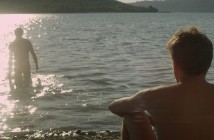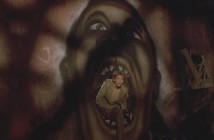
Editor’s Note: Reviews this week are by Ronan Doyle and Jose Gallegos
Memory’s short with so many movies over so many weeks, but it’s a while I think since our humble column here had a selection so lacking in anything especially of note to hoist upon you. That’s not to say we’re without a host of recommendations; while nothing here quite has us excitedly enthused, there’s at least a few stray titles of note. Next week, with May’s first-of-the-month content explosion to sate us, we ought to fare better.

Charlie Countryman
It should come as little surprise to anyone who’s seen the film that Charlie Countryman was made by a director who cut his teeth on music videos and commercials. Fredrik Bond has a fine eye for a good shot, a strong sense of cohesion to his sequences, and a certain aesthetic vibrancy that brings out the wackier aspects of his feature debut. What he hasn’t got, at all, is any idea how to make a movie that hangs together as anything beyond a group of loosely-interrelated things happening. The tonal sensibility here—rather the utter lack thereof—is stupefying, sequences existing in an emotional register entirely divorced from those either side. That the film tends largely to succeed within much of these makes it all the worse: had Bond and his writer Matt Drake—one name among several on Project X—the sense to settle on one story here the movie might well be fun. AVOID IT. ~RD

Come Undone
Sébastien Lifshitz’s Come Undone follows the relationship between Mathieu (Jérémie Elkaïm) and Cedric (Stéphane Rideau). The two spend their romantic summer on the French coast, making love in the dunes and exploring all that the pier has to offer. Lifshitz intercuts these blissful moments with a different temporal plot line involving Mathieu’s attempted suicide after his and Cedric’s breakup. These intersecting narrative threads create an intriguing juxtaposition of blind romance confronting a cold and stark reality. The handling of the material becomes a bit jumbled after a while, but it still shows a powerful and emotional romance that rivals any of those depicted in the stereotypical gay films on Netflix. RECOMMENDED. ~JG

Danny Deckchair
Tonal imbalance aplenty in Danny Deckchair too, the directorial debut of the storyboard artist Jeff Balsmeyer, based on the tale of a man who lifted himself to the heavens in a lawnchair tethered to helium balloons. There might be no actor better-suited to the blend of eccentricity and sadness befitting the character, a Australian builder looked down upon by his real estate agent girlfriend, than the great Rhys Ifans; what he brings to the film before its wacky flight is nothing shy of wonderful. What he brings to it afterward, once Danny lands and improbably becomes the local hero of a town who somehow miss his face all over national media, is simply not enough. But nothing could be: Danny Deckchair is goofy nonsense through and through, barely able to raise a laugh in its tedious rom-com trappings. Given Balsmeyer’s background, it’s appallingly uninteresting to look at, too. AVOID IT. ~RD

Don Jon
What promise there is in the montage that opens Joseph Gordon-Levitt’s directorial debut Don Jon, as the kind of highly-sexualised imagery we’re used to seeing in every advert flashes across the screen to the tune of JGL’s efficiently meat-headed voiceover. This is a smart script, equally attuned to the improbably expectations both men and women have been given by the media of love and sex, and the lines between the two. Why it isn’t such a smart film, then, is something of a mystery: with his characters consciously constructed as satirical shells, Gordon-Levitt progresses simply to make a love story around them, as though expecting us to appreciate them as real humans too. We can’t if he doesn’t, and Don Jon’s latter-half lapses into a drama as competently-mounted as it is remarkably rote. Julianne Moore and Scarlett Johannson do much to help in support, and it’s always nice to have Tony Danza back on screen. SO-SO. ~RD

Exit Through the Gift Shop
There’s much to be said for 2010 as the year we started to think about documentary cinema afresh. There was nothing new in the medium coming to question its own assumed truths, of course—Man with a Movie Camera was doing that as far back as the 1920s—but the Sundance premieres of Catfish and Exit Through the Gift Shop brought to the fore the idea of fact as stranger than fiction. Banksy’s is a playful treat of a film, a devilish romp in which what “really” happened is less important than the questions it raises, and the ideas of art and its value that come to be considered in the course of the fun. Its haggard qualities, like the street art that gave the director the very fame with which this movie is concerned, are part of the charm; Exit Through the Gift Shop’s a film with an awful lot to say. RECOMMENDED. ~RD

Instructions Not Included
Valentin (Eugenio Derbez) is a Mexican playboy with a lot of phobias (heights, snakes, etc.). When one of his hookups leads to an abandoned baby at his doorstep, Valentin does anything he can to provide for the child (including, as incredulous as it sounds, becoming a Hollywood stuntman). Eugenio Derbez’s Instructions Not Included is as syrupy a melodrama as they come, borrowing many techniques from telenovelas (cheesy effects, aimless plotlines, celebrity “look-a-likes,” and stupid jokes). What saves the film is the rapport between father and daughter, whose relationship is chronicled up to its tearful climax. I recommend having a box of tissues handy because you will not be prepared for the last ten minutes of the film. RECOMMENDED. ~JG

Jailbait
Jared Cohn’s jigglefest is less grounded in reality and more grounded in a Russ Meyer film. It tells the story of Anna (Sara Malakul Lane) who goes to jail after she accidentally kills her abusive stepfather. Anna endures everything from manipulative wardens to rival prison gangs, leading her to experiment with drugs and attempt suicide. Dramatic, right? Cohn’s film is set in a strange prison fantasy where women have access to iPhones, underwire bras, and heroin. It is a horrible and problematic film that uses a faux-feminist stance to exploit big-breasted actresses in unrealistic lesbian scenes. Cohn tries to hide his exploitative elements in order to make his film seem “real” and “emotionally raw,” but it is just another chauvinist fantasy wrapped in sheep’s clothing. AVOID IT. ~JG

Odd Thomas
It’s an appropriate adjective that grabs the eye on Odd Thomas’ poster: what an odd, odd, odd film this is. Were one less-well informed, it might be fair to assume its delay (due to legal troubles) was actually the fault of the distributor having no good clue what to do with it. Either way it’s unlikely they did. Anton Yelchin stars in a fantasy-inflected romance that looks, for all the world, like another film-by-numbers YA adaptation, but between the Dean Koontz source novel and writer/director Stephen Sommers’ strange treatment thereof, the resultant movie is something quite different indeed. That’s a good and a bad thing in about equal measure: cloying romance and dodgy CGI belie some strong comedy and a story that’s surprisingly ruthless when it comes to it. It’s as much for the peculiar flavour of its failures as the unexpected successes that Odd Thomas, however odd, comes to be so watchable. SO-SO. ~RD

The Benchwarmers
Those who decry Adam Sandler and his Happy Madison Production as the nadir of modern cinema, quite simply, haven’t seen enough movies. Here at This Week on Demand HQ we’ve sunk so far below the bottom of the barrel that the work of Sandler and co. seems a treat by comparison. Though let’s not get ahead of ourselves here: The Benchwarmers isn’t any good at all; it’s a poorly acted, barely written mess with a sense of humour that panders clearly to those too young—if the MPAA has anything to say about it—to get in. It’s also, in parts, a little offensive, risibly retrograde in its attitude to anyone who isn’t a straight male. It ought not be watched, indeed, but to suggest it’s as low as humanity has sunk on screen is just silly. Perhaps this seems like praising with faint damnation. Praise is rather a strong word. AVOID IT. ~RD

The Hunting Party
“Only the most ridiculous parts of this story are true” winks the title card of The Hunting Party, instantly endearing itself to anyone sick of those movies whose real-life inspiration is evidently a far cry from what we see onscreen. Evidently Richard Shepard is the playful sort, and his script’s sense of fun in tackling the story of a trio of journalists who go hunting a Bosnian war criminal is invaluable indeed. What’s less so is the pitiful structure, which is poor enough before reaching the climax and deciding simple to side-step half the story. Richard Gere does well with an interesting role; he’s an actor who conveys more depth than he tends to be credited for, and here—for all the surrounding flaws—he does that well. Jesse Eisenberg and Terrence Howard flesh things out well; the three between them ensure that the story gets its due, right up to the point Shepard denies it. AVOID IT. ~RD




Pingback: free instagram followers june 2016()
Pingback: http://www.flatratecomputerservice.com/()
Pingback: netflix free account code()
Pingback: banheira()
Pingback: great products()
Pingback: yspro.ne.jp()
Pingback: porno()
Pingback: fast diet()
Pingback: Camelia()
Pingback: over at this website()
Pingback: Best buy cell phone accessories()
Pingback: Leaflets()
Pingback: movie2k()
Pingback: medora centre()
Pingback: bikini luxe()
Pingback: foundation repair()
Pingback: league of legends sweatshirt()
Pingback: email verifier()
Pingback: eague of legends t-shirt shop()
Pingback: Laga iPhone Göteborg()
Pingback: Wiki links()
Pingback: Brandbanglaeshop()
Pingback: plumbing()
Pingback: plumbing repair()
Pingback: kids toys catalogs()
Pingback: fastest web proxy()
Pingback: Financing()
Pingback: Laser hair removal nyc()
Pingback: golf range netting()
Pingback: golf range netting()
Pingback: Escort()
Pingback: minneapolis pay per click()
Pingback: ebay deals of the day india()
Pingback: handicapped transportation()
Pingback: Kinder()
Pingback: How To Sell My House Fast San Antonio Texas Area()
Pingback: nonemergency medical transportation()
Pingback: toy()
Pingback: Carburetors()
Pingback: Freelance illustrator()
Pingback: th8 war base anti dragons()
Pingback: sacred 3 trainer()
Pingback: history of name()
Pingback: eyelash extensions about()
Pingback: L’Mage Advanced Moisturizing Complex()
Pingback: Best Affiliate Marketing Programs()
Pingback: plumbing repair circle c()
Pingback: news()
Pingback: streetwear store()
Pingback: Bail Bonds Tampa()
Pingback: self help podcastsTai Lopez on iTunes()
Pingback: Water filters in Barrie Ontario()
Pingback: italian baby names()
Pingback: stlpiky()
Pingback: Santiago Thornburg()
Pingback: http://waterdamagerestoration-austin.com/()
Pingback: movietube()
Pingback: Mp3 Urbano()
Pingback: boom beach diamond hack()
Pingback: Simple Drawing()
Pingback: weight loss for busy entrepreneur()
Pingback: eating healthy busy()
Pingback: antispam e.v.()
Pingback: logo design brisbane()
Pingback: candy floss machine rental()
Pingback: bottled water dispenser cooler()
Pingback: alimente bio()
Pingback: Medical marijuana card online()
Pingback: Free Marvelous Designer stitches tutorial()
Pingback: Penginapan Murah Di Depok()
Pingback: auto mould()
Pingback: Jasa Tukang Taman Balikpapan()
Pingback: new homes()
Pingback: web design portugal()
Pingback: sell house fast()
Pingback: design studio()
Pingback: Car text check()
Pingback: Buy Isagenix 9 Day()
Pingback: vape kits()
Pingback: brake pads rotors()
Pingback: Banheiras()
Pingback: binary option()
Pingback: free porn()
Pingback: How To Get A Girl To Like You()
Pingback: Best Minneapolis acupuncturist()
Pingback: Realtor BPO REO Real Estate Foreclosure()
Pingback: net wages calculator()
Pingback: need money now()
Pingback: flat belly overnight program()
Pingback: and center in your car()
Pingback: garcinia cambogia canada()
Pingback: diet pills()
Pingback: web page design houston()
Pingback: Instantly ageless jeunesse()
Pingback: Ipro Academy 2.0 Review()
Pingback: homework help()
Pingback: Bail Bondsman Tulsa()
Pingback: Vietnam travel guide()
Pingback: Mindy()
Pingback: What Women Want In A Man()
Pingback: ESTELLE()
Pingback: exercise()
Pingback: ollas rena ware()
Pingback: whatsapp channel numbers()
Pingback: Brooksville carpet cleaning()
Pingback: Credit specialist()
Pingback: real estate brokerage new port richey()
Pingback: car accessories near allen texas()
Pingback: best selling products()
Pingback: sticky notes for computer windows 10()
Pingback: real estate brokerage Clearwater()
Pingback: tv antennas placement()
Pingback: ComeGuadagnare()
Pingback: Femme de menage montreal()
Pingback: Cash 4 Clothes()
Pingback: fashion ring()
Pingback: IATA Pet Travel Box in Colombo()
Pingback: Secure internal door()
Pingback: tenerife property()
Pingback: http://6addiction.com()
Pingback: Cleaning Quotes()
Pingback: 12win()
Pingback: Josefina()
Pingback: http://zombiediary2hackandcheats.com/()
Pingback: rosengard.tv()
Pingback: Crawler Dozers For Sale()
Pingback: Legend(Regarder Legend en streaming}()
Pingback: roasting pan or baking dish()
Pingback: outdoor party light ideas()
Pingback: solar related()
Pingback: lovetts pet & home care()
Pingback: Corrupt Judge Robert G Creely()
Pingback: mobile strike hack()
Pingback: free kik guide()
Pingback: tablet()
Pingback: thick2fit()
Pingback: duckbill check valve water flood diffuser()
Pingback: Mortgage Broker Singapor()